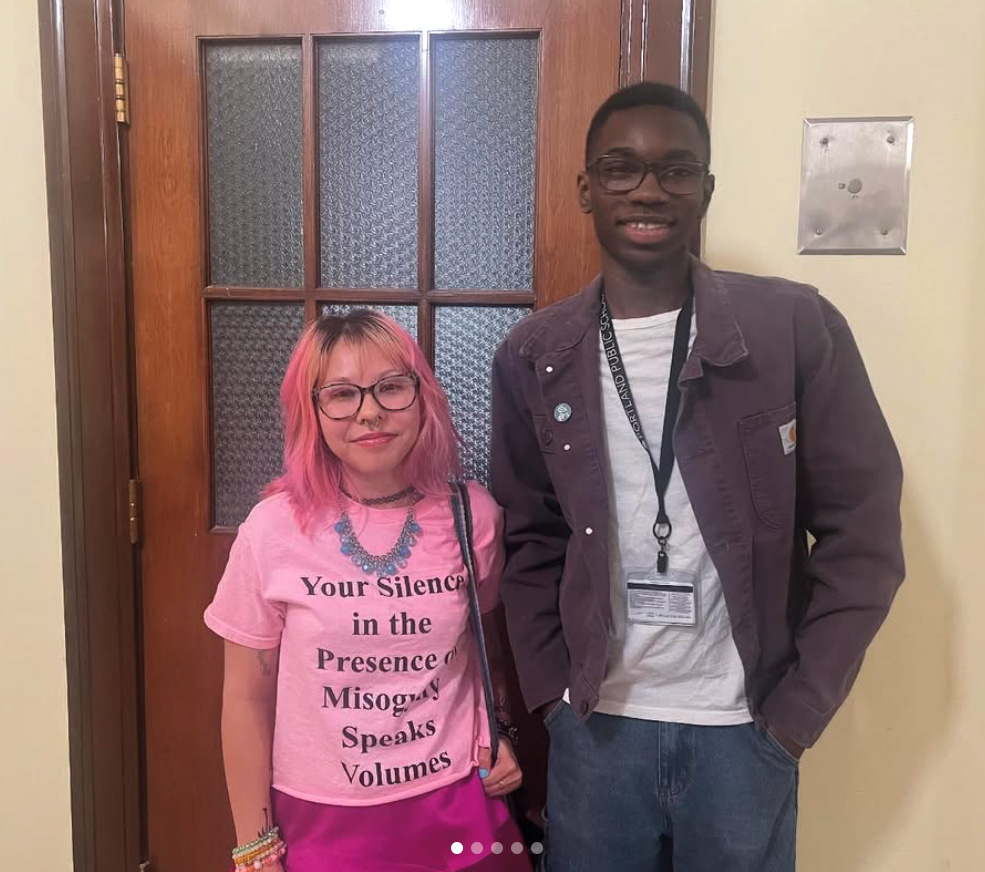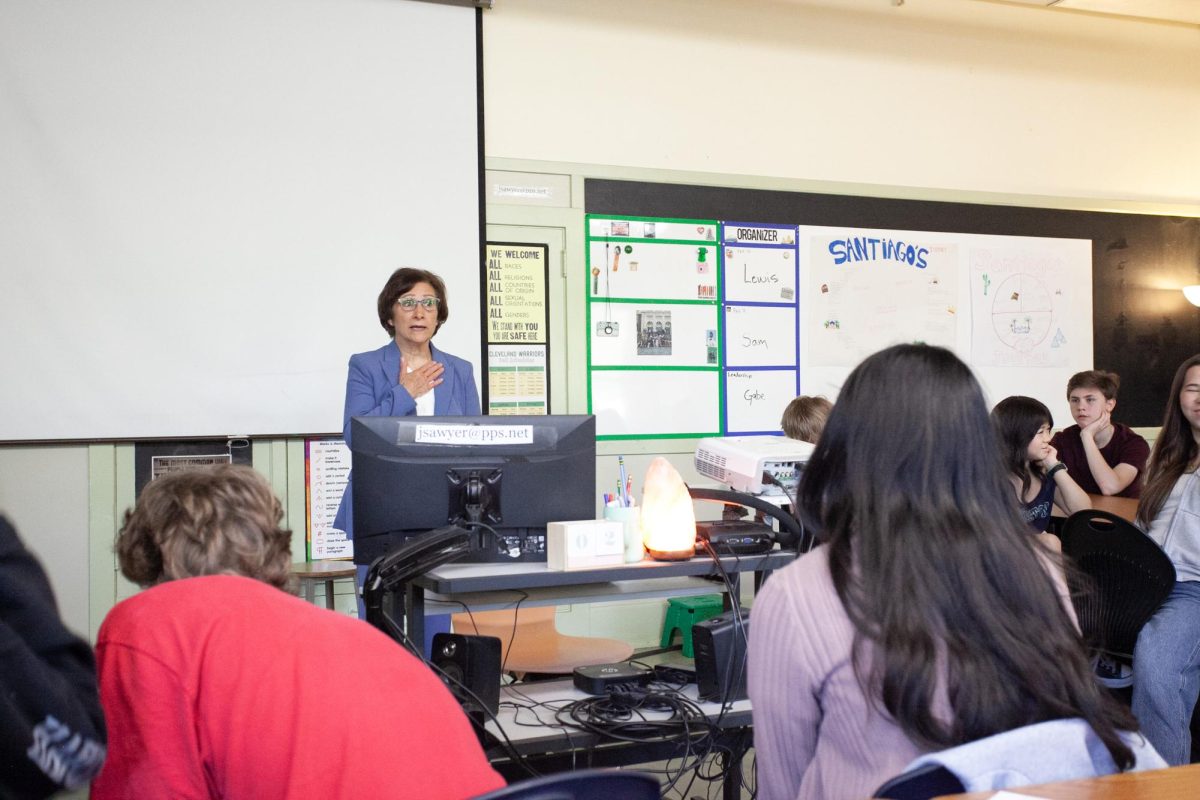A Preview of this Year’s I.B. Extended Essays
February 18, 2017
The infamous Extended Essay: finally coming to a close. Full I.B. students have spent a year and a half crafting 4,000 word essays that explore a topic of their interest. On Feb. 22, the culminating presentation will occur, in which all full I.B. students will discuss their work with an audience of parents and students. The following students are just a small preview of the talent and intellect that will be shared at the I.B. Extended Essay Showcase.
Jaden Berger: To what extent does the Panama Canal contribute to the global air pollution?
“I had a connection to Panama,” said senior Jaden Berger. During the summer after her junior year, Berger lived in a mountainous community of Panama, participating in an environmental outreach program with Amigos de Las Americas. She explained, “We planted trees, and in my community we started a garden and environmental club with the kids.”
Originally, Berger planned on studying the human rights violations committed by past dictators in Panama. However, as governmental terms became increasingly overbearing, she reverted to the topic of Environmental Systems and Societies. As a child, Berger attended the Opal School, a small elementary and preschool in the basement of the children’s museum. Everyday, the students walked to the Hoyt Arboretum, causing Berger to have “grown up learning about the environment.”
Berger began her research with a basis of historical knowledge about the Panama Canal. In 1914, President Theodore Roosevelt financed a team to engineer a canal through Panama. By doing so, large ships could move through Latin American trading routes in a more timely manner than the previous two week journey.
When exploring the different factors that yield air pollution, Berger found that there weren’t any available studies that described the combustion of fossil fuels caused by ships in the Panama Canal. Instead, Berger calculated fossil fuel emissions from multiple sources, in all the various routes that ships sailed, not exclusively in the Panama Canal, then compared her findings to global emissions. Berger explained, “I studied individual chemicals. I learned about the traits of all the chemicals and how they relate. For example, Nitrogen and Nitrogen Oxide don’t directly contribute to pollution, but they bond with other chemicals to create elements that contribute to greenhouse gases.”
Having spent time around the canal, Berger was able to use trusted environmental groups in Panama for research purposes. Eventually, she found that “when comparing the emissions of the Panama Canal to the global emissions, the pollution wasn’t significant. However, when comparing land mass in Panama, which is a small fraction of the world’s land mass, you can see how much more air pollution will affect Panama.”
Researching for the Extended Essay proved valuable for Berger, she explained. “It was fun to study a topic that I’m not going to have a chance to study again. Revising was the worst part, because I wasn’t learning anymore.”
Wyatt Freda-Cowie: Why are people in urban areas of Bhutan happier than people in rural areas, and what does this mean for the future of Bhutan?
Last spring, as senior Wyatt Freda-Cowie began looking into topics for his Extended Essay, a family friend was planning an immersive trip in Bhutan, a small country near Tibet and Nepal. Freda-Cowie explained that during the beginning stages of his research pertaining to Bhutan, “I found a urban rural divide in happiness, and I was curious about that.”
In the 1970s, the Bhutanese government developed an alternative method to measuring a country’s economic productivity and inflation. “Every five years they do a national survey, in which the government has between seven and eight thousand Bhutanese people fill out a survey that details anything from how much money they make, to if they have a car, to how many times an animal has destroyed their crops in the past year and half,” detailed Freda-Cowie.
With all of this data gathered, the Bhutanese government is able to create a Gross National Happiness Index. Freda-Cowie elaborated, “Basically, it’s a number that they use to gauge the happiness of the population of Bhutan.” The index is ideally used to influence policy and maximize the happiness of Bhutan. Freda-Cowie explained, “It’s supposed to be a holistic measurement for the country of Bhutan.”
After Freda-Cowie attained the Gross National Happiness Index of Bhutan, other data was necessary. However, “Bhutan is a really small country and it’s relatively isolated, only in the past 100 years have they become connected to the outside world, and so often times it’s really hard to get data,” explained Freda-Cowie.
Through his research, Freda-Cowie found “that people were moving from rural areas to urban areas, partly due to environmental conservation laws. Urban Bhutan is very focused on preserving the environment, which affects the rural farming land.” By investigating the disparity between urban and rural lands, Freda-Cowie learned that the Bhutanese government is able to better understand what is required for the country’s future. After successes with the Gross National Happiness Index were recorded in Bhutan, the United Nations has begun working toward applying a similar census in other countries.
Freda-Cowie believes that writing the Extended Essay was a helpful experience for future college endeavors. He said, “Learning how systems interact was very interesting,” however, “it’s really hard to organize a 4,000 word essay. I knew what I wanted to talk about, but, in the beginning of the writing process, not in a coherent way that would work with the Extended Essay format.”
Conor Bergin: How is George Costanza a symbol of the Id in Freudian Philosophy?
“I grew up watching ‘Seinfeld.’ We quote it all the time in my family. It’s also one of the best comedy shows ever written, and one of my passions is comedy writing. So, I thought it would be cool to do an in-depth analysis of the show,” explained senior Conor Bergin.
Originally Bergin wanted to write his Extended Essay on the ways in which “Seinfeld” is a reflection of existentialism; it’s a show about nothing and mocks that life doesn’t really matter. However, this topic was too difficult to find substantial evidence on.
Instead, Bergin said, “I thought about doing it on George Costanza, my favorite character in ‘Seinfeld’ because he is just really a flawed character; he’s a loser and he’s lazy.” During his junior year, Bergin explained, “We learned about Freud and his tripartite theory for how the mind works. There’s three parts, the Id, the Ego, and the Superego.”
The Id, according to Freudian Philosophy, is the lazy part of the brain. It gives into the brain’s most primitive urges, like aggression and sexual desires. Bergin expanded, “The Id doesn’t correspond with the outside world’s expectations, it has no conscious.” The Ego and Superego, however, “monitor your desires in respect to what’s going on in the world.”
The focus of Bergin’s essay was to show the ways in which George Costanza resembles the Id and how he doesn’t have an Ego or Superego. For Bergin’s birthday in July, he received the complete series of “Seinfeld.” In a less conventional research process, Bergin watched all of “Seinfeld” over the summer.
Bergin explained that even though George is a terrible character, viewers still love him. “He is so likeable because everybody has urges from the Id, but we monitor them and don’t talk about them, so, in this way, people can relate to George.” Bergin found that “Seinfeld” was the first sitcom to play off the Id, in that the entire cast was unlikeable. “Seinfeld” also included a large amount of sexual content, which became revolutionary for TV sitcoms today.
“Changing my question was really difficult, but after that, it got a lot easier,” said Bergin. Throughout his essay, Bergin related George to the Id in three manners: his sexual, aggressive, and self-deprecating behavior.
Bergin concluded, “I think what made ‘Seinfeld’ so good was that it makes fun of the bad ways we think. Comedy exposes our guilty thoughts, so this research has helped give me awareness into these techniques. Even though comedy is for entertainment, it is interesting to see how much truth there is about human tendencies.”










